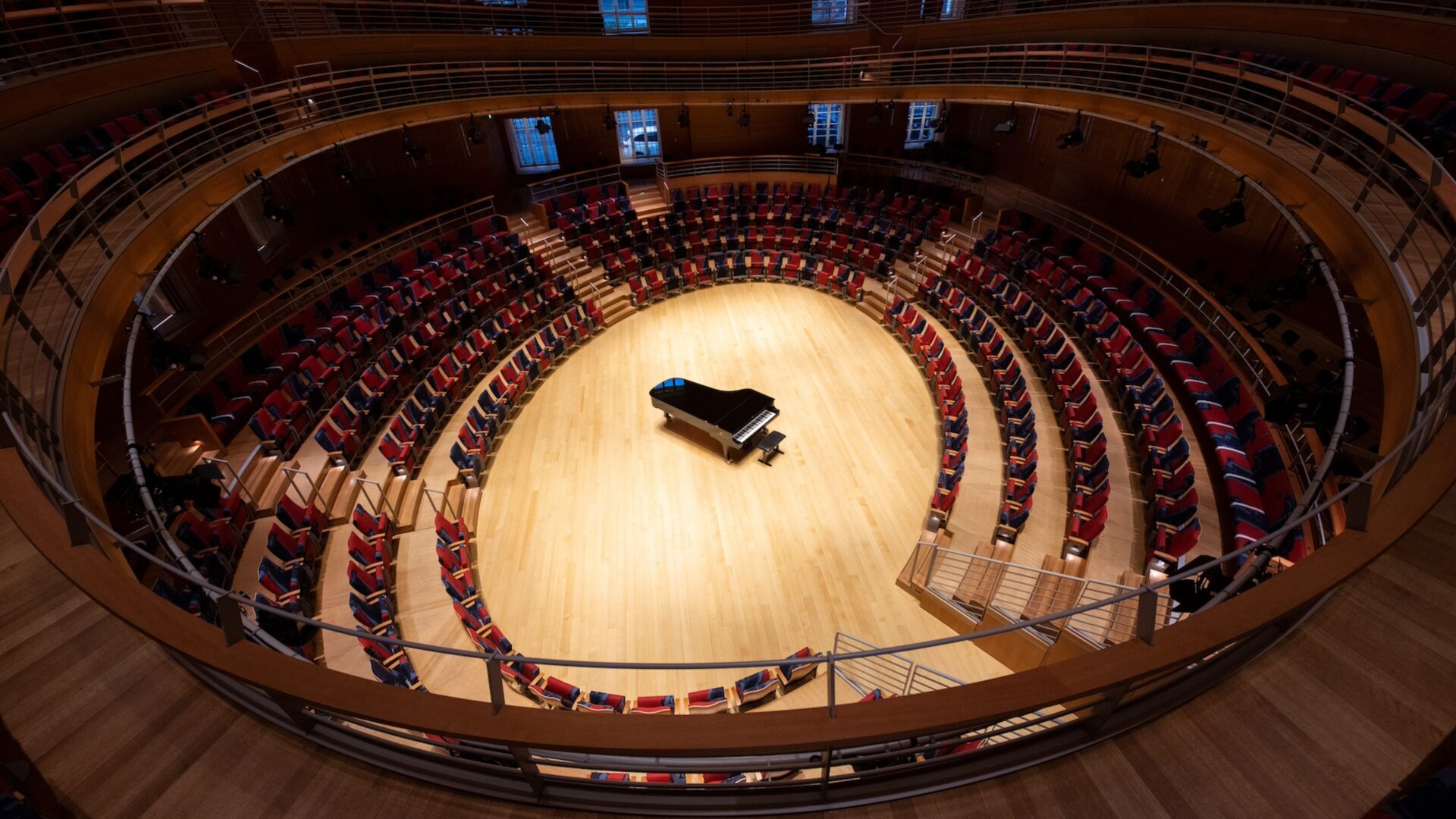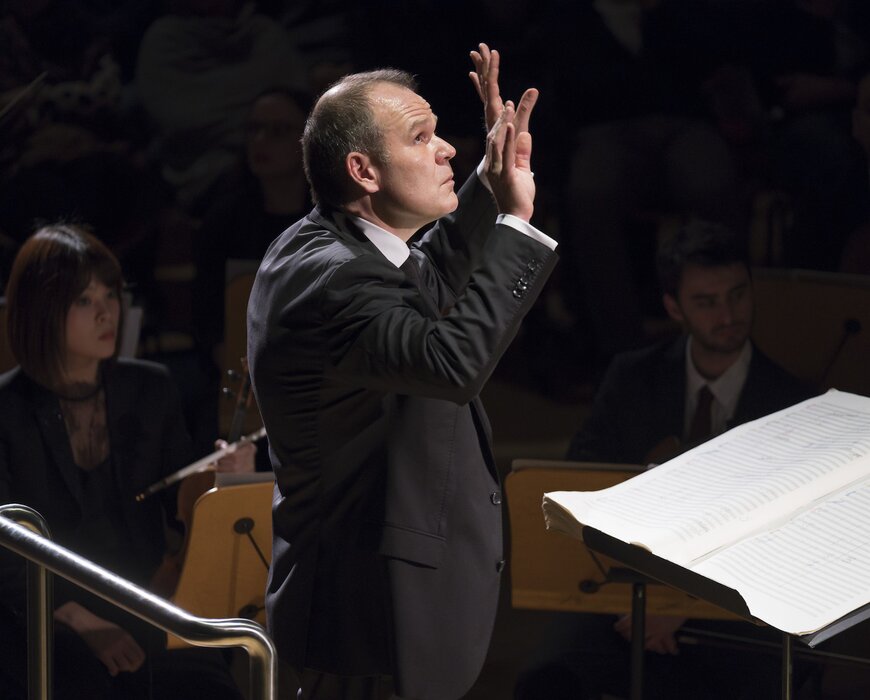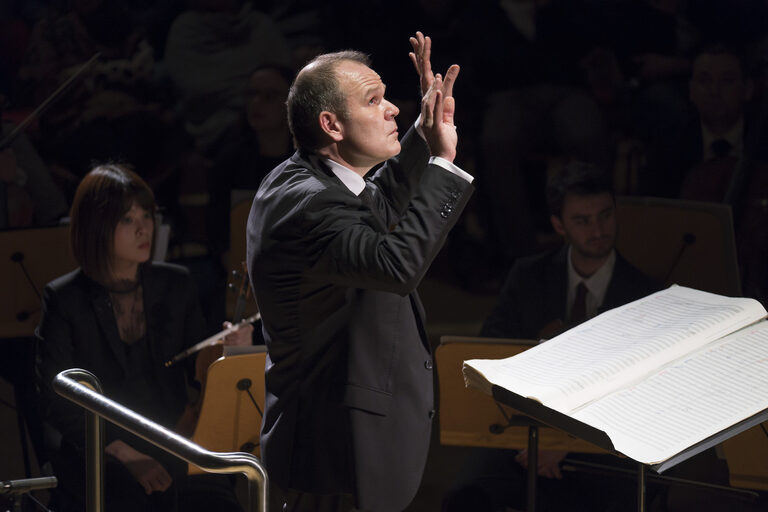Sun, October 29, 2023 at 4:00 PM
BOULEZ ENSEMBLE & FRANÇOIS-XAVIER ROTH
The Grammar of Sound: Works by Manoury and Debussy
Pierre Boulez Saal
The music of Philippe Manoury, one of the leading French composers of our time, has been heard regularly at the Pierre Boulez Saal. Conducted by François Xavier Roth, the Boulez Ensemble performs two of his larger ensemble works: Passacaille pour Tokyo of 1994 as well as Grammaires du sonore, premiered in Paris in 2022, in which the composer explores new forms of musical grammar and syntax. Equally groundbreaking chamber music written by Claude Debussy during the last years of his life completes the program.
Artists
Conductor
Piano
Flute, Piccolo & Alto Flute
Flute, Piccolo & Bass Flute
Oboe, Baritone Oboe
Oboe, Cor Anglais
Clarinet
Clarinet
Bass Clarinet, Contrabass Clarinet
Bassoon
Bassoon, Contra Bassoon
French Horn, Wagner Tuba
French Horn, Wagner Tuba
Trumpet, Fluglehorn
Trumpet, Flugelhorn
Trombone
Trombone
Saxhorn, Bass Trumpet
Drums
Percussion
Drums
Piano, Celesta
Harp
Violin
Violin
Violin
Viola
Viola
Violoncello
Violoncello
Violoncello
Double Bass
Program
EVENT TIMELINE
Discovering New Sonorities A Conversation with François-Xavier Roth
Among contemporary composers, Philippe Manoury is remarkable for working in many different genres and formats. Tell us about the two pieces you’ll be conducting at the Pierre Boulez Saal.
Manoury is best known for his electronic music and his close association with IRCAM in Paris, but he’s also a very traditional composer who has always been fascinated by the orchestra and the possibilities of orchestration. I would say he’s a bit similar to Berlioz—one of those composers who seek to explore new orchestral parameters. I discovered his music through Pierre Boulez, who greatly admired his compositions. Manoury’s piece Numéro 5 was featured in the program of the very first concert of the Ensemble intercontemporain.
With the Boulez Ensemble, we’ll be performing two of his compositions. I had the great honor of premiering Grammaires du sonore in Paris last year. The piece is scored for a large ensemble and encompasses a lot of parameters from his previous works. For many years, Manoury has been exploring a “new grammar” in the musical sense, creating highly sophisticated structures with different instruments, some of which are rarely used in contemporary music. Passacaille pour Tokyo is an earlier work from 1994, with a big solo piano part and another piano within the ensemble that shadows the first. It’s a very poetic piece.
How do these unusual instruments inform the sounds we’ll hear in Grammaires du sonore?
One of Manoury’s main compositional goals, like that of every composer exploring new dimensions, is to create music that we’ve never heard before, using classical instruments and musicians. An essential aspect of his music also raises the question of how to surprise audiences with the ensemble in front of them. In Grammaires du sonore, we encounter instruments like Wagner tubas, saxhorn, or baritone oboe. Who composes for these instruments today? Manoury uses them to also present a new dimension of virtuosity among musicians. He organizes musicians into groups, so you can hear both: the ensemble playing together like an orchestra or in smaller groups. It works like a zoom, a close-up for each group. It’s extremely interesting. Other composers might transform the sound of an instrument, but with Manoury it’s different—he uses the sound to reveal multiple facets for a single musician.
In the score, he also gives very detailed instructions on the “grammar” of the piece…
Manoury establishes subtle and sophisticated relationships between various sequences, somewhat resembling a theater play. One of the most exciting aspects of working with him is that he shares his drafts, which have helped him shape the structure of his composition. One could say that French composers are obsessed with form. For Manoury it’s more like a game, it’s not only mathematics or science.
With everything you just mentioned, what are the challenges of conducting his music?
He has been consistently pushing the limits of what musicians can do in performance. He’s extremely demanding, but he knows exactly what’s possible. Manoury really hears what he writes, a trait not shared by every composer, even among the great ones. His music is joyful, rich, and full of unknown sonorities. This is why I love conducting his pieces: he constantly explores new musical territories.
The program also includes two sonatas by Debussy. What connects these two composers? Is there such a thing as a “French tradition”?
Philippe Manoury is extremely interested in the music of the past. On his website, you can find some of his analyses of Wagner’s operas, among others. Debussy is one of his heroes, and Debussy’s music has had a significant influence on him, particularly works like Jeux or Pelléas et Mélisande. There’s a certain musical lineage connecting Debussy, Boulez, and Manoury, as they share a common musical language. Some elements of Manoury’s compositions, such as timbre, articulation, and other acoustic phenomena, are also a major part of Debussy’s musical language or more broadly, the French tradition. Both composers’ works have the potential to transform the way we perceive the concert hall and the sounds we hear. This program is a tribute to two giants of French music—which is closely linked to the Pierre Boulez Saal and the Boulez Ensemble.
Interview: Tyme Khleifi
Edited by Wioleta Zochowska
watch
YOUR VISIT
How To Get There
Pierre Boulez Saal
Barenboim-Said Akademie
Französische Straße 33d
10117 Berlin
_____
Public Transport
U-Bahn U2 Hausvogteiplatz, U5 Museumsinsel, U6 Unter den Linden
S-Bahn S / U Friedrichstraße
Tram M1, 12 Mitte / Am Kupfergraben
Bus 147 Werderscher Markt; 100, 300, N5 Staatsoper
Bicycle
Bicycle racks are available on the street “Hinter der Katholischen Kirche.”
Car
Q-PARK parking garage Unter den Linden / Staatsoper
Bebelplatz 2
10117 Berlin
Theater rate (5.30 pm – 11.30 pm, paid in advance): €10
Please note there is a construction site across from the hall on Französische Straße. The street is narrowed, and cars or taxis are not allowed to stop in front of the Pierre Boulez Saal entrance.
Opening Hours
Box Office
Monday to Friday 2 pm to 6 pm
Closed on weekends and holidays
On performance days, the box office opens one hour prior to an event on weekdays and two hours on Saturdays, Sundays, and holidays.
Papagena Call Center
Ticket hotline +49 30 4799 7411
Monday to Saturday 9am to 8pm
Sunday and public holidays 2pm to 8pm
Food & Drinks
Casalot Catering welcomes Pierre Boulez Saal visitors before and after concerts, serving a variety of dishes of Arab cuisine.
On concert nights, the bar opens one hour before the start of an event and remains open after the performance. You may also place pre-orders for intermission right at the counter.
More informantion on our catering can be found here.
Coat Check
Small bags up to a maximum size of A4 (21x30 cm) and jackets may be taken into the concert hall. Luggage, helmets, large umbrellas, and other bulky items must be stored at the coat check.
The coat check is free and located behind the staircase in the foyer, on the left-hand side.
Accessibility
To book wheelchair-accessible seating, other seats for visitors with disabilities, or companion seats, please contact us directly.
+49 30 4799 7411
tickets@boulezsaal.de
All wheelchair seats are accessible by elevator. All visitors, including patrons using a wheelchair, will enter the Pierre Boulez Saal through the main entrance. Tickets will be checked at the hall doors.
In order to make access as easy as possible, we kindly ask that you inform us of your requirements when booking your tickets.
Restrooms for visitors with disabilities are located in the basement and on the balcony level and are accessible by elevator.
Four parking spaces for visitors with disabilities are available on the street Hinter der Katholischen Kirche.


